Table of Contents
Free NZ
!function(r,u,m,b,l,e){r._Rumble=b,r[b]||(r[b]=function(){(r[b]._=r[b]._||[]).push(arguments);if(r[b]._.length==1){l=u.createElement(m),e=u.getElementsByTagName(m)[0],l.async=1,l.src="https://rumble.com/embedJS/udh4zl"+(arguments[1].video?'.'+arguments[1].video:'')+"/?url="+encodeURIComponent(location.href)+"&args="+encodeURIComponent(JSON.stringify([].slice.apply(arguments))),e.parentNode.insertBefore(l,e)}})}(window, document, "script", "Rumble");Rumble("play", {"video":"v2jrgk2","div":"rumble_v2jrgk2"});
Pregnant women are traditionally the last to receive a new pharmaceutical intervention due to rigorous safety standards. The Covid pandemic has unpicked the fabric of this safety blanket. As more information now comes to light, it’s crucial that we re-examine the messaging that pregnant women continue to receive.
Data contradicts claims that all pregnant women are at high risk of Covid. In fact, healthy pregnant women are at no more risk than the general population. Moreover, healthy people under 50 have a low risk of severe disease, hospitalisation or death from Covid.
With that in mind, is the push to vaccinate all NZ pregnant women with the Pfizer Comirnaty injection, a wise or proportionate response?
Obtaining the Pfizer Clinical Trial Data
Public Health and Medical Professionals for Transparency (PHMPT) comprise over 600 clinicians and academics who collaborated to obtain and disseminate Pfizer’s raw trial data. In this short video, Dr Peter Doshi explains the importance of independent scientific analysis of raw data.
!function(r,u,m,b,l,e){r._Rumble=b,r[b]||(r[b]=function(){(r[b]._=r[b]._||[]).push(arguments);if(r[b]._.length==1){l=u.createElement(m),e=u.getElementsByTagName(m)[0],l.async=1,l.src="https://rumble.com/embedJS/udh4zl"+(arguments[1].video?'.'+arguments[1].video:'')+"/?url="+encodeURIComponent(location.href)+"&args="+encodeURIComponent(JSON.stringify([].slice.apply(arguments))),e.parentNode.insertBefore(l,e)}})}(window, document, "script", "Rumble");Rumble("play", {"video":"v230prk","div":"rumble_v230prk"});
After the US regulator, Food & Drug Administration (FDA), declined PHMPT’s request to access the trial data which was used to authorise the Pfizer product, a lawsuit was filed.
For reasons which are becoming obvious, and which are deeply concerning, Pfizer and the FDA requested a delay of 75 years for the data release.
The judge ruled in favour of PHMPT, ordering the release of the documents in monthly lots. Both PHMPT and their lawyers at ICAN are now publishing these documents as they are released.
Recognising that only skilled professionals could adequately scrutinise such extensive volumes of data, America’s Dr Naomi Wolf made a public call for assistance. Teams of highly qualified volunteers – including biostatisticians, clinicians, scientists and medical fraud investigators – are reviewing and analysing the data. Their summations are then published at Daily Clout.
Pfizer Trials Investigating Pregnancy and Breastfeeding Outcomes
To date, there is only one completed Pfizer randomised control trial looking at healthy pregnant women. It has not yet been published. There are multiple limitations to this trial, including:
- small sample size,
- maximum follow-up time to six months after birth,
- and a plan to vaccinate the placebo arm, eliminating the possibility of comparing long-term outcomes.
Pfizer’s January 2021 Nonclinical Evaluation Report reveals highly concerning data related to experimentation on 44 pregnant Wistar rats, which were followed for 42 days. This research formed the basis for authorities to recommend, and even mandate, vaccination of humans. The best that can be said of this study is that it stands as a grim illustration of the annihilation of scientific ethics.
Regulatory standards have since diminished even further, with the bivalent product approved following research on only eight mice.
The report shows the distribution of mRNA-containing Lipid Nano Particles (LNPs) throughout the body. LNPs efficiently cross all human membranes, including the blood-brain and placental barriers, and into breast milk.
Pre-implantation loss (when a fertilised egg does not implant into the uterine wall) occurred in
- 4.1% of the Wistar rat control group, and
- 9.8% of Pfizer’s Comirnaty group.
The investigators – investors and employees of Pfizer-BioNTech – claimed this serious safety signal could be dismissed as a ‘normal effect’.
Twelve different foetal abnormalities were observed in the rat litters, and all occurred at much higher rates in the Comirnaty group.
No further relevant studies (e.g. developmental progress of the pups) were conducted. You can investigate more at The False Messaging on Vaccines Given to Pregnant Women.
Pregnancy and Breastfeeding Outcomes in Other Pfizer Trials
Although pregnant women are specifically excluded from all other Pfizer trials, unexpected pregnancies can, and often do, occur. Specific trial protocols define what constitutes Exposure During Pregnancy (EDP) and Exposure During Breastfeeding (EDB).
The protocols require immediate follow-up by investigators when an exposure is identified.
Two specific documents released so far have reported on data taken from the Pfizer safety database up to 28 February 2021 involving cases of EDP and EDB.
The outcomes are catastrophic.
Post-Authorization Report
The Cumulative Analysis of Post-Authorization Adverse Event Reports was released into the public domain in November 2021, with a reissue in April 2022.
An extraordinary breach of clinical trial standards occurred, namely, the absence of reportage about pregnancy outcomes for the majority of the EDP cases. There were 274 EDP cases identified during this trial, and yet 238 of them were totally excluded from the final report on the trial results.
Of the remaining 36 EDP cases, 28 women lost their baby to foetal and/or neonatal death.
Numerous clinical symptoms were experienced by women exposed during pregnancy, including
- chest pain and uterine contractions.
- Four baby cases experienced intrauterine growth restriction, premature birth, and neonatal death.
Of the 133 EDB reports, 17 clinical events were reported. Symptoms in women included
- breastmilk discolouration
- suppressed lactation.
This could significantly impact breastfeeding rates, which are an important factor in maternal and infant health outcomes.
Three serious infant cases of EDB were reported but their symptoms were not separated from the non-serious cases.
A case reported in VAERS describes the March 2021 death of a breastfed five-month-old. The baby’s mother had received her second Pfizer dose just the day before the symptom onset.
Pfizer Pregnancy and Lactation Cumulative Review
In April 2023 a Pregnancy and Lactation Cumulative Review was released. This has been reported on at Daily Clout, and by journalist Sonia Elijah.

Again, clinical trial standards are breached, with missing data and apparent calculation errors.
The report lists
- 53 spontaneous abortions, 15 of which were excluded due to other risk factors
- six premature births, including two confirmed neonatal deaths.
Six breastfeeding infants reportedly experienced serious adverse events, including illness requiring hospitalisation.
Other adverse events included facial paralysis, nose bleeds and blurred vision.
What Does the NZ Data Show?
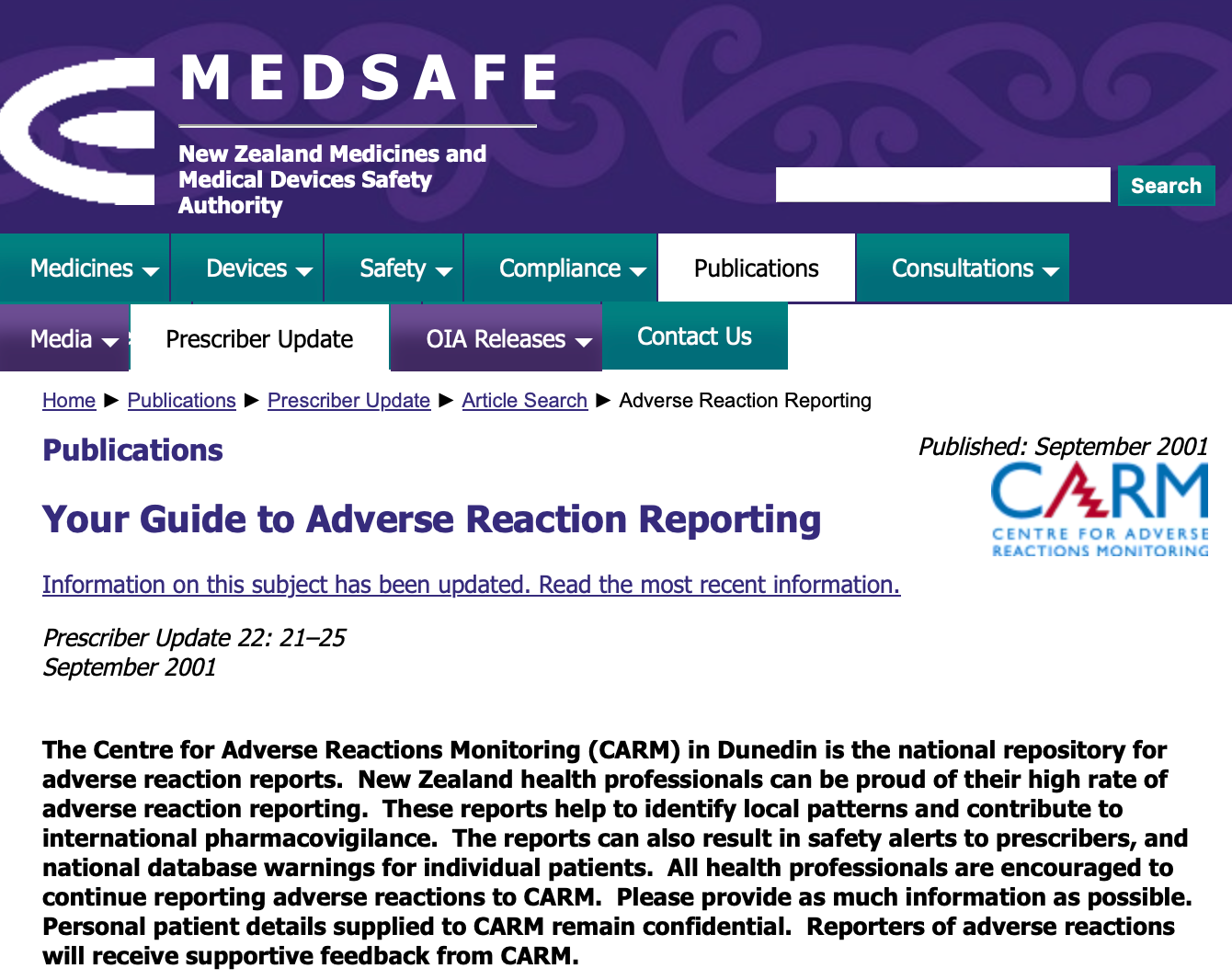
Medsafe New Zealand’s Centre for Adverse Report Monitoring (CARM) states that only 5% of actual side effects are reported.
This voluntary reporting scheme is woefully inadequate for post-marketing monitoring of a new product.
CARM initially published regular reports on the Covid vaccine, but have since stopped. The last report, published in December 2022, has 67 records of spontaneous abortion (miscarriage). These are tabulated as an adverse event of special interest (AESI), defined as “medically significant events that have the potential to be causally associated with the vaccine and must be carefully monitored”.
Two key questions arise from this:
- Is this highly-relevant information being conveyed to pregnant women?
- What is being done to investigate further?
The Medsafe database for the ten years Jan 2010 to Dec 2020, records a total of nine pregnancy adverse events for all influenza vaccinations administered in NZ, none of which were miscarriages.
Compare this to the 67 miscarriages recorded in less than 18 months for the Covid vaccine – a dramatic increase!
According to the Immunisation Advisory Committee (IMAC), data on the exact number of pregnant women in NZ who were injected with Pfizer is unavailable.
An Australian study claims 69% uptake amongst pregnant women. A similar number is likely in New Zealand given the similarities between our governments’ Covid responses.
Assuming a 5% adverse event reporting rate, the 67 miscarriages identified by CARM could represent a figure as high as 1340. Using this figure, the number of live births for 2022, and the uptake rate of 69%, we come to a possible 3% increased miscarriage rate associated with the Pfizer injection. It’s sobering to note that the increase in pregnancy loss was identified by Pfizer itself.
Overseas data paints a similar picture, as clearly delineated by Dr Tina Peers speaking on the UK’s deplorable safety standards.
!function(r,u,m,b,l,e){r._Rumble=b,r[b]||(r[b]=function(){(r[b]._=r[b]._||[]).push(arguments);if(r[b]._.length==1){l=u.createElement(m),e=u.getElementsByTagName(m)[0],l.async=1,l.src="https://rumble.com/embedJS/udh4zl"+(arguments[1].video?'.'+arguments[1].video:'')+"/?url="+encodeURIComponent(location.href)+"&args="+encodeURIComponent(JSON.stringify([].slice.apply(arguments))),e.parentNode.insertBefore(l,e)}})}(window, document, "script", "Rumble");Rumble("play", {"video":"v2akcnc","div":"rumble_v2akcnc"});
Increased miscarriage rates are a safety signal for congenital abnormalities. The use of thalidomide to treat morning sickness in the 1960s resulted in 100,000 birth defects globally. What women didn’t know at that time, was that the drug was also responsible for an increase in miscarriages.
Loss of a baby is categorised as
- a spontaneous abortion or miscarriage up to 20 weeks
- a stillbirth, fetal death or perinatal death after 20 weeks.
The Perinatal Mortality and Morbidity Review Committee (PMMRC) administers a national database reporting on all perinatal deaths. Reports are usually published with a one-year delay, but with Covid restrictions interrupting workflow, there is currently a two-year delay. It will therefore be some time before any effects of the Covid injection rollout are reported.
There is no national database recording miscarriage rates in New Zealand.
The estimated background rate of miscarriages is 15.3% of all recognised pregnancies. The risk of miscarriage falls with gestational age, and most occur in the first 12 weeks of pregnancy. In the second trimester (12-20 weeks), the risk of miscarriage is between 2-3%.
Losing a baby at 5 weeks can be a very different experience from losing one at 18 weeks, yet they are both categorised as spontaneous abortion/miscarriage.
The CARM database does not stipulate the gestational age of the 67 miscarriages reported after the Covid injection. It is simply not acceptable to write them all off as early pregnancy loss, without this vital information.
As we have outlined, so far no safety studies have involved pregnant women. How then, did the official messaging claim that these injections were safe in pregnancy?
The Ministry of Health website states there are no safety concerns for pregnancy or breastfeeding, without providing a link to any supporting evidence. When you go digging, the Shimabukuru study is often cited. This observational study is significantly flawed, with inherent bias, because most participants were vaccinated in the third trimester.
Another frequently-cited study, Lipkind et al, uses statistical chicanery to assure us that miscarriage rates are not a safety signal. Almost half of the authors have declared financial associations with Pfizer.
Studies using the CDC Vaccine Safety Datalink (v-safe) information continue to be published and claim there are no safety signals in pregnancy. However, this raw data is not available for independent analysis.
In an updated study, sponsored by US Centers for Disease Control, the same investigators admit that safety concerns are causing hesitancy among pregnant women. Product marketing appears to be a motivating factor for their research, especially when viewed alongside their conflict of interest disclosures which highlight their connections with Pfizer and other pharmaceutical giants.
Using American v-safe data, one study showed an 18.8% miscarriage rate associated with the Covid injection, which at the very least warrants further investigation.

The current government-led messaging to pregnant women is that being vaccinated means they are far less likely to fall seriously ill. This is in direct contrast to data showing the number of hospitalisations is higher in the fully vaccinated and boosted population.
Informed Consent
Informed consent is a bedrock in pregnancy care, and most interventions and procedures are discussed at length. For example, if a woman is offered amniocentesis (an extraction of amniotic fluid from around the baby in utero, for genetic testing), then the small risk of miscarriage (1-3/per 1000 or 0.1-0.3 %) is discussed. What is considered an acceptable level of risk, and who defines this? The answer is that it differs for every woman, and a robust discussion is the least health professionals can offer.
Using the same logic, if there is a possible 3% increased risk of miscarriage with the Covid injection, then shouldn’t pregnant women also be told about this so that they can make an informed decision?
It is simply unacceptable to say that any conversation involving the unknowns, and risks, of the Pfizer injection is ‘misinformation’ or ‘antivax’ messaging.
Midwives were silenced during the pandemic by their regulatory body. The concept of informed consent that we usually hold sacrosanct was (and continues to be) relegated in favour of a zealous need to get ‘everyone to do it for their whanau’.

Ethical Considerations
How is it ethical to force an experimental medicine on a pregnant woman?
It is not.
No-jab-no-job is the very definition of coercion, and pregnant women facing mandates had no option for exemption. The precautionary principle was discarded, and Dr Bloomfield deemed pregnancy and/or breastfeeding no reason for reprieve.
Was it proportional or even acceptable to deny pregnant women an exemption? Where was the bioethical advice to the government, and what happened to the guiding principles in the Health Act? Read this article for a thorough analysis of how normative principles were set aside during Covid.
- J.R.Bruning Talking Risk
- COVID-19 IN NEW ZEALAND. ETHICS & THE SETTING ASIDE OF NORMATIVE PRINCIPLES.
- COVID-19 IN NEW ZEALAND. ETHICS & THE SETTING ASIDE OF NORMATIVE PRINCIPLES. This discussion paper draws attention to the setting aside of ethical obligations in law, and moral dilemmas over the COVID-19 pandemic, of 2020-2022. I suggest that in the absence of such considerations, a weakening of democratic and ethical norms occurred, excluding important …
- Read more
Medical professionals daring to ask questions, or suggest precautions, were demonised and threatened. Highly qualified and experienced midwives who questioned – faced a painful witch hunt mostly from within our own profession.
Disciplinary action was threatened against anyone reported as spreading ‘misinformation’. We were to provide women with ‘evidence-based information and advice’. The problem was that with Comirnaty, there was no evidence -because there are no good-quality safety studies!
Now, the Bivalent booster is recommended for pregnant women, with no Medsafe reports available. These reports were our last vestige of safety monitoring.
Recent communication to midwives recommends Pfizer as the preferred choice during pregnancy ‘due to the lack of safety data for Novavax’.
Do we laugh or cry?
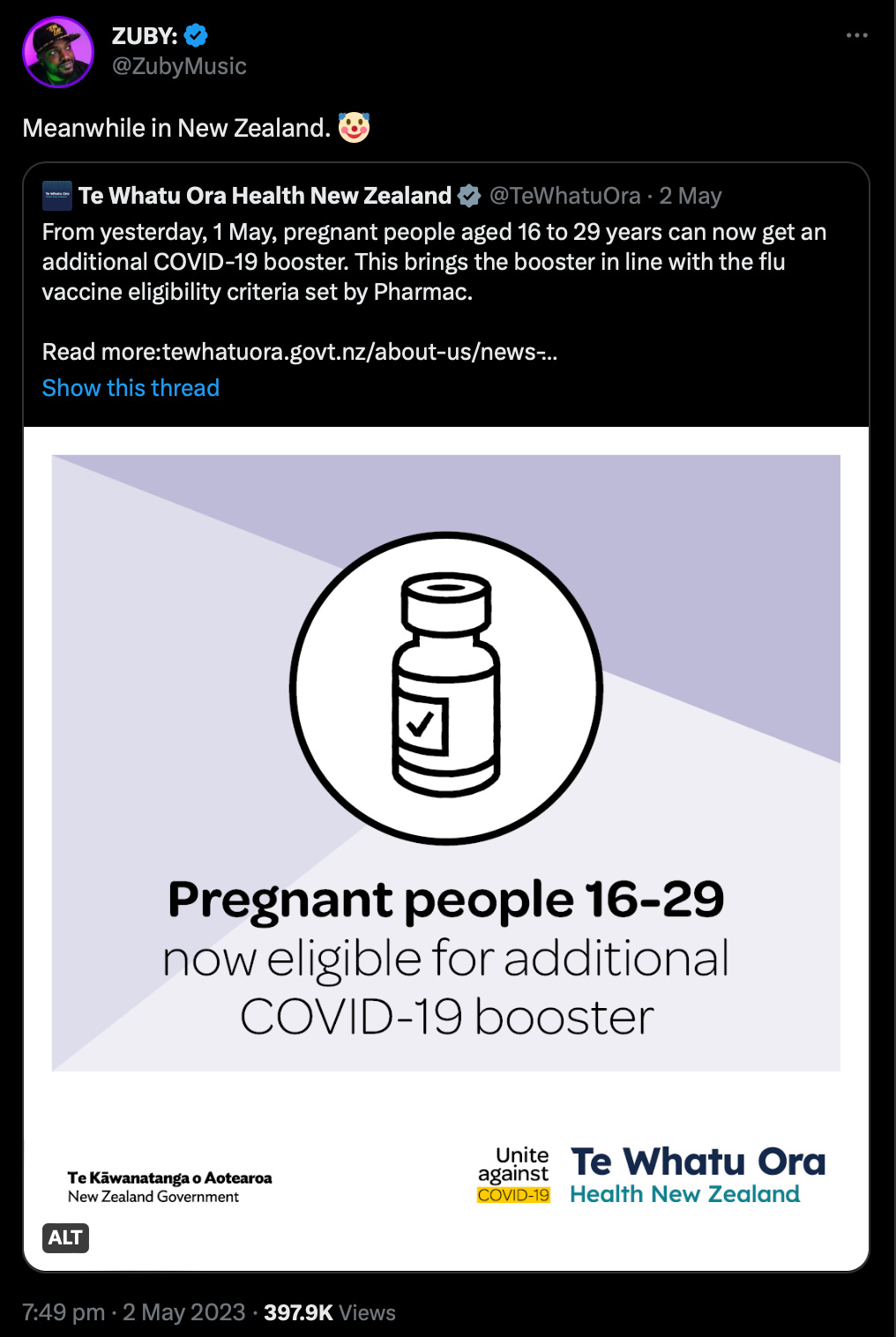
During a September 2021 online webinar, IMAC’s Dr Nikki Turner stated that
“NZ will never, I hope and believe, make vaccination compulsory because it’s an individual choice”.
Less than one month later the government announced mandates for all health workers.
Dr Turner also spoke of boosters being recommended only for the immune-compromised, and that yearly shots for Covid should not be needed. In another webinar, midwives were told that the spike protein did not cross into breastmilk. These claims have all since proven to be false.
One nurse who frequented these webinars, Bronwyn Robinson, a COVID-19 Immunisation Education Facilitator at IMAC was interviewed on Radio New Zealand about how she “convinced the hesitant to get the vaccine” and then explained how members of the public should do the same.
If women had known that mRNA crosses the placenta and into breast milk, would they have been so willing to ‘take one for the team’? Are the so-called experts who repeatedly claim it is safe and effective, even aware of the Pfizer documents? New Zealand’s ‘accredited’ news media appear to not only have no knowledge of them but are also thoroughly unwilling to engage in any meaningful investigation, let alone simple questioning on the subject.

In Conversation with Kirsten Murfitt about her Open Letter to Members of Parliament
Follow the Money
When interpreting the results of any piece of scientific research, it is imperative that potential conflicts of interest are considered and disclosed. In this Covid era, it now appears that medical research ethics have been dismantled, through excessive industry influence. Dr Pierre Kory described this succinctly in his recent presentation to the European Parliament.
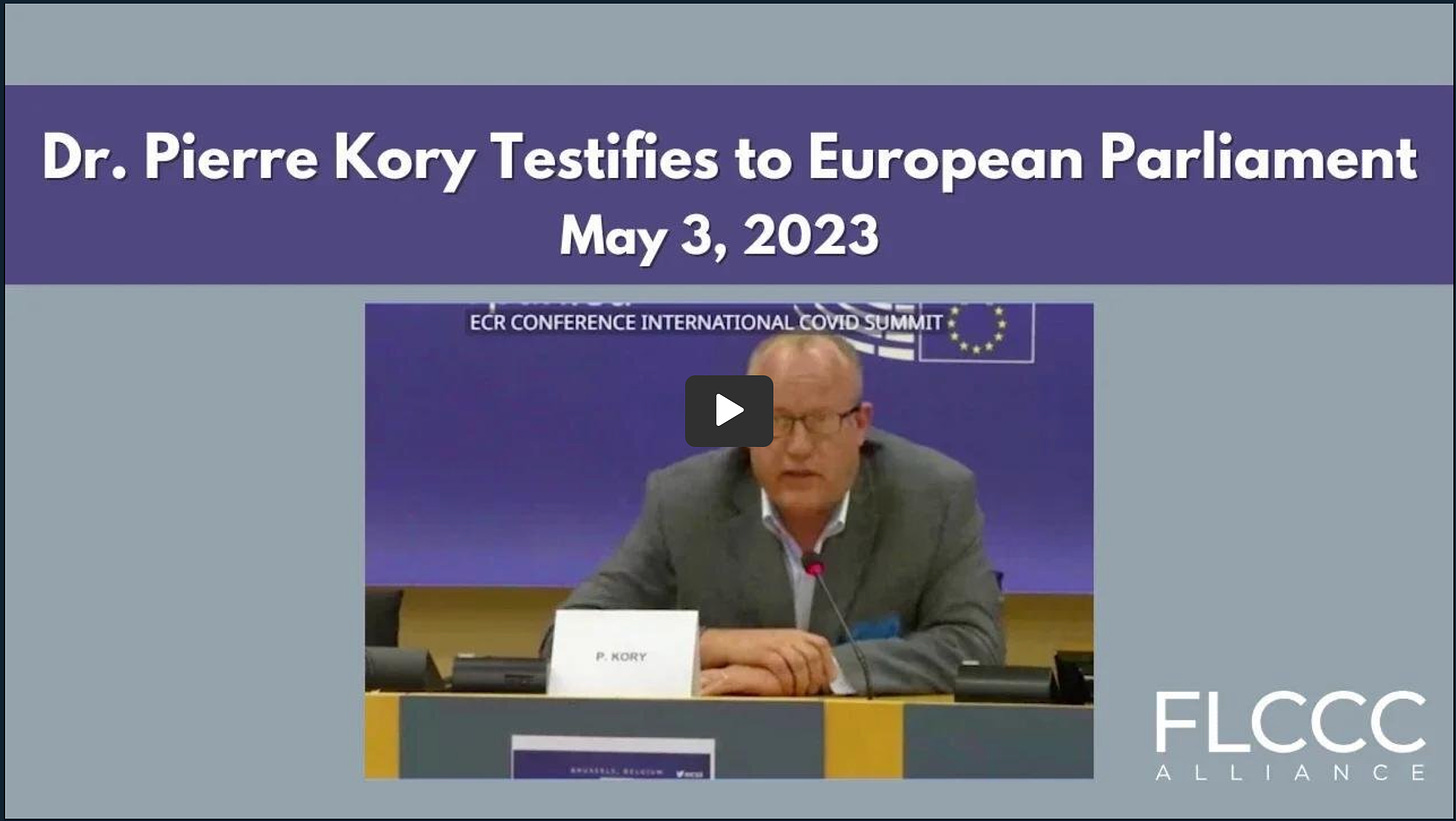
A comparison between responses related to adverse events following immunisation, over time, demonstrates this erosion of ethics. When 15 infants developed bowel obstructions after receiving a new Rotavirus vaccine in 1998-99, the product was withdrawn for investigation. Ten years later, a GSK ‘swine flu’ vaccine was promoted by GSK and regulators, despite known safety signals.
Has the pharmaceutical industry become increasingly skilled at colluding with regulatory agencies?
In a 2019 presentation on his role as Belgium’s Flu Commissioner during the 2009 ‘pandemic’, Dr Marc Van Ranst described, in detail, ways in which to manipulate public perception for financial gain.
It was recently revealed that the
American College of Obstetricians and Gynaecologists received US$11m to promote Covid-19 vaccination in pregnancy.
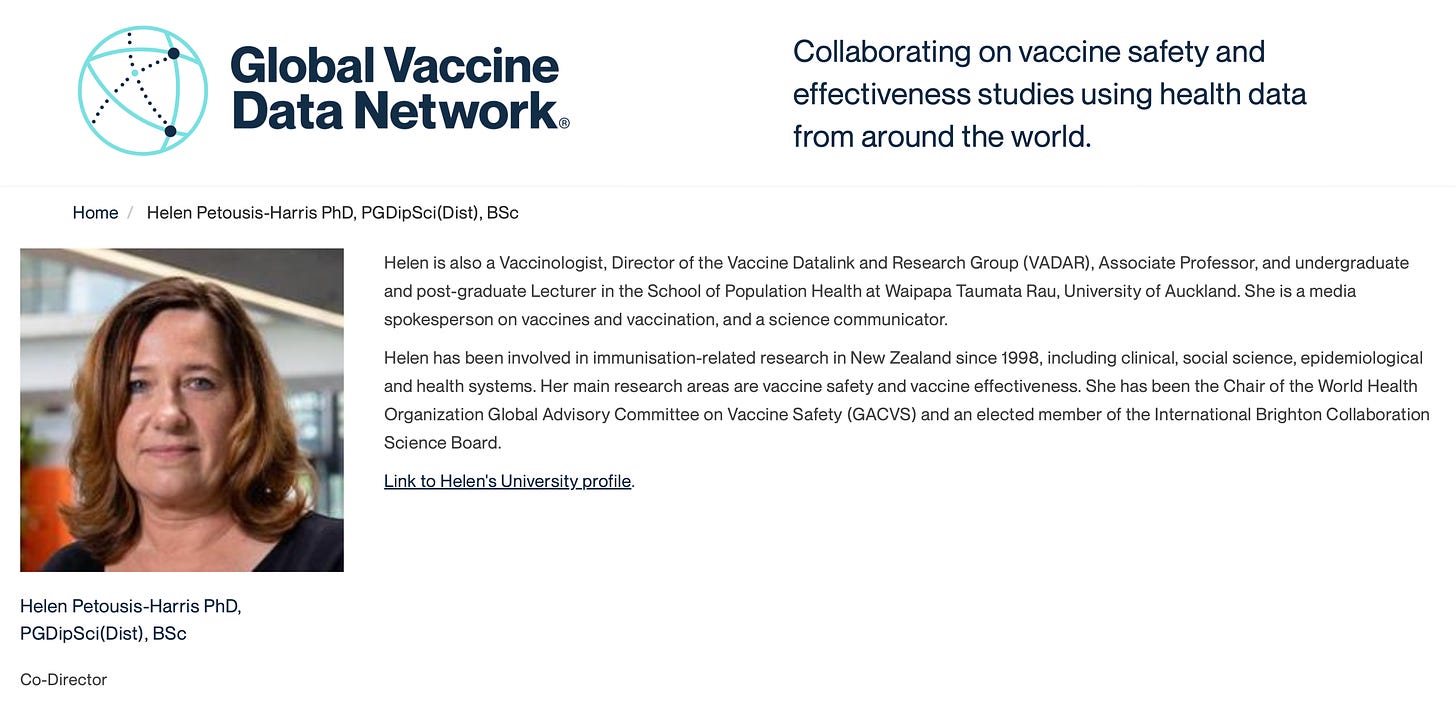
New Zealand vaccinologist Dr Helen Petousis-Harris actively promotes Covid-19 vaccinations, including those for pregnant women. As Co-Director of the Global Vaccine Data Network, she has direct ties to pharmaceutical giants Fondation Mérieux and the Gates Foundation. Similarly, IMAC is connected to pharmaceutical funding via the World Health Organisation’s Vaccine Safety Net.

Reproductive Immunologist at Imperial College London, Dr Viki Male actively promotes Covid-19 mRNA products for child-bearing age, pregnant and breastfeeding women, using what has been described as ”junk science”. Her significant conflicts of interest include a patent for nanoparticle delivery systems owned by her father. Read more about this, and the ways statistics in pregnancy are being manipulated and misrepresented, at A miscarriage of statistics: The thalidomide sequel.
The Gates Foundation have sponsored Imperial College to the tune of at least $302 million. Gates funding also sponsors Covax, an initiative targeting low-resource nations using the slogan “no one is safe, until everyone is safe”.
This unscientific claim ignores the fact that most populations in poor nations already have immunity.
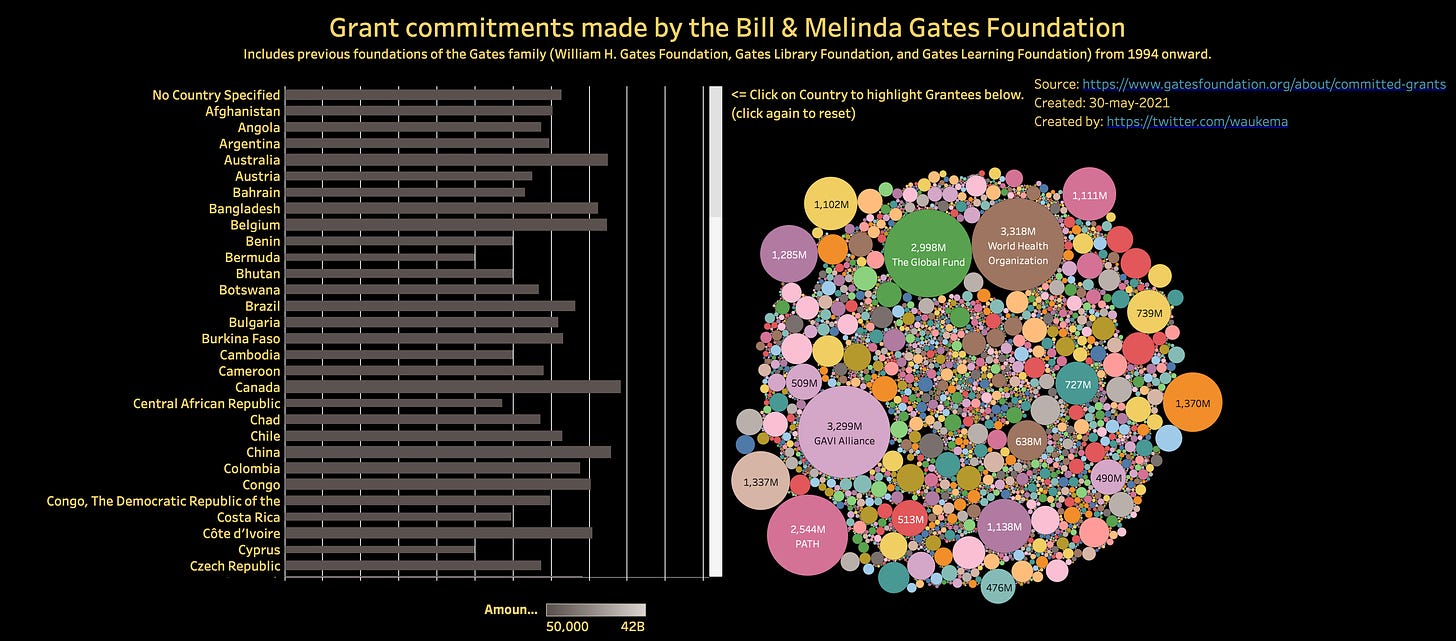
Rather than requiring a multi-billion-dollar vaccine program, achieving positive health outcomes across the poorer parts of the world should be about basic needs, such as access to clean water, safe housing, nutrition and health literacy.
Collusions between government advisors, regulators, and the pharmaceutical industry continue to be uncovered on a regular basis. A recent seminar on Big Pharma influence was held at Hillsdale College in the USA, illustrating harmful levels of corruption, as reported by NZDSOS.
Conclusion
Pfizer’s own clinical trials show that safety and efficacy outcomes in pregnancy are at best incomplete, and at worst, causing severe harm, including death, to an unknown proportion of trial participants and their in-utero offspring.
Serious safety signals in nonclinical animal trials have also been disregarded.

The Pfizer data, known to regulators since early 2021, explicitly contradicts the ‘safe and effective’ advice. Post-marketing surveillance of the Pfizer injection in pregnancy is simply not happening in New Zealand. Never have we injected so many people, including pregnant women, with novel technology.
Where is the research investigating the potential impact of this on future generations? We need only look at the outcomes following Diethylstilbestrol (DES) administration in pregnancy, to see that unintended negative health consequences can take a generation to manifest.
We urgently need an independent inquiry to assess whether our response to the pandemic was proportional, particularly in regard to mandates for pregnant women.
Sometimes, as health advocates, it feels as if we are shouting into the wind, but it is the same wind that carries change. And so, like a song on repeat, we will continue to keep speaking up for informed consent and bodily autonomy even if only the wind hears us.









